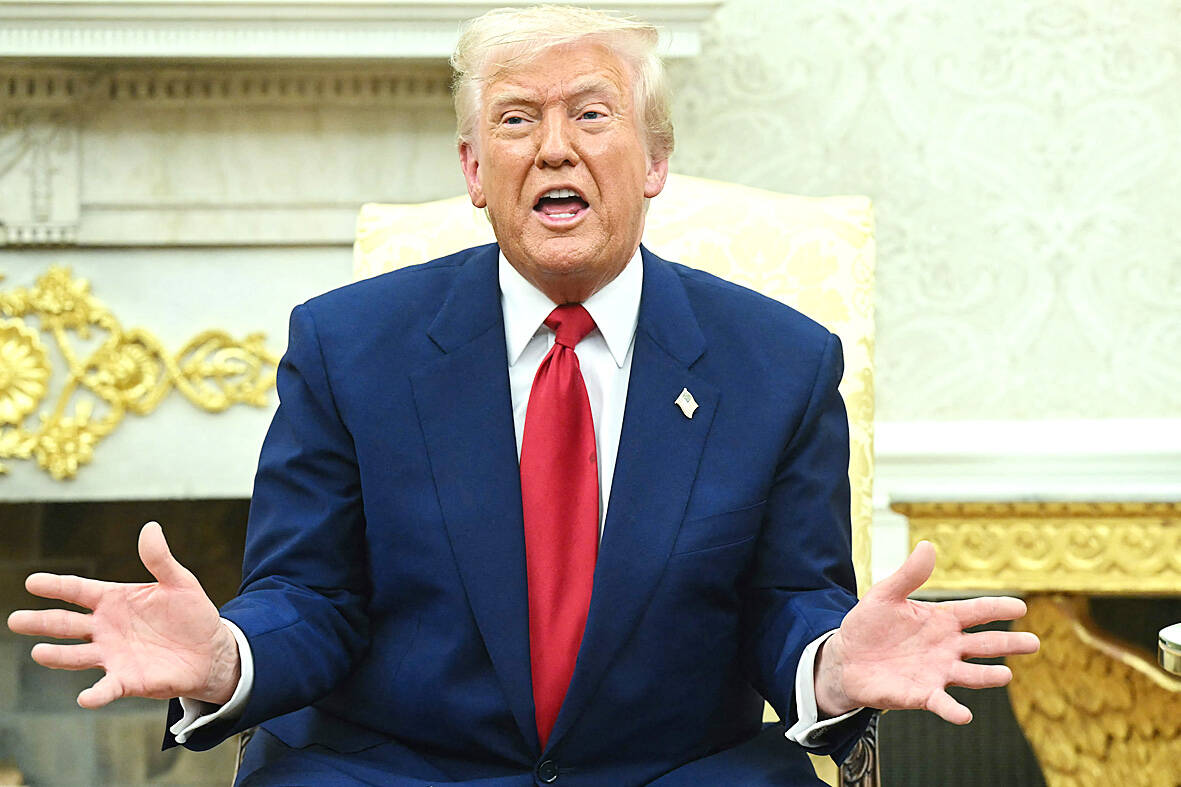China yesterday vowed to “fight to the end” against fresh tariffs of 50 percent threatened by US President Donald Trump, further aggravating a trade war that has already wiped trillions off global markets.
Trump has upended the world economy with sweeping tariffs that have raised the specter of an international recession, but has ruled out any pause in his aggressive trade policy, despite a dramatic market sell-off.
Beijing responded by announcing its own 34 percent duties on US goods to come into effect tomorrow, deepening a showdown between the world’s two largest economies.

Photo: AFP
The swift retaliation from China sparked a fresh warning from Trump that he would impose additional levies if Beijing refused to stop pushing back against his barrage of tariffs — a move that would drive the overall levies on Chinese goods to 104 percent.
“I have great respect for China, but they cannot do this,” Trump said in the White House on Monday. “We are going to have one shot at this... I’ll tell you what, it is an honor to do it.”
China swiftly hit back, criticizing what it called “blackmailing” by the US and vowing “countermeasures” if Washington imposes tariffs on top of the 34 percent extra that are due to come into force today.
“If the US insists on going its own way, China will fight it to the end,” a Chinese Ministry of Commerce spokesperson said yesterday.
Beijing urged Washington to instead “adopt an attitude of equality, respect and mutual benefit” if it wanted to engage in talks.
A 10 percent “baseline” tariff on US imports from around the world took effect on Saturday, and a slew of nations are to be hit by higher duties from today, including the levy of 34 percent for Chinese goods.
Trump’s tariffs have roiled global markets, with trillions of US dollars wiped off combined stock market valuations.
The US president doubled down on Monday, saying he was “not looking” at any pause in tariff implementation.
Trump also scrapped any meetings with China over tariffs, but said the US was ready for talks with any nation willing to negotiate.
US Secretary of the Treasury Scott Bessent said in an interview with Fox News on Monday that Japan would get “priority” in negotiations over the US tariffs “just because they came forward very quickly.”
Scores of nations have sought talks, Bessent said, adding that “through good negotiations, all we will do is see levels come down.”
While meeting Israeli Prime Minister Benjamin Netanyahu, the first leader to lobby Trump in person over the levies, Trump said: “There can be permanent tariffs and there can also be negotiations, because there are things that we need beyond tariffs.”

The US government has signed defense cooperation agreements with Japan and the Philippines to boost the deterrence capabilities of countries in the first island chain, a report by the National Security Bureau (NSB) showed. The main countries on the first island chain include the two nations and Taiwan. The bureau is to present the report at a meeting of the legislature’s Foreign Affairs and National Defense Committee tomorrow. The US military has deployed Typhon missile systems to Japan’s Yamaguchi Prefecture and Zambales province in the Philippines during their joint military exercises. It has also installed NMESIS anti-ship systems in Japan’s Okinawa

‘WIN-WIN’: The Philippines, and central and eastern European countries are important potential drone cooperation partners, Minister of Foreign Affairs Lin Chia-lung said Minister of Foreign Affairs Lin Chia-lung (林佳龍) in an interview published yesterday confirmed that there are joint ventures between Taiwan and Poland in the drone industry. Lin made the remark in an exclusive interview with the Chinese-language Liberty Times (the Taipei Times’ sister paper). The government-backed Taiwan Excellence Drone International Business Opportunities Alliance and the Polish Chamber of Unmanned Systems on Wednesday last week signed a memorandum of understanding in Poland to develop a “non-China” supply chain for drones and work together on key technologies. Asked if Taiwan prioritized Poland among central and eastern European countries in drone collaboration, Lin

NO CONFIDENCE MOTION? The premier said that being toppled by the legislature for defending the Constitution would be a democratic badge of honor for him Premier Cho Jung-tai (卓榮泰) yesterday announced that the Cabinet would not countersign the amendments to the local revenue-sharing law passed by the Legislative Yuan last month. Cho said the decision not to countersign the amendments to the Act Governing the Allocation of Government Revenues and Expenditures (財政收支劃分法) was made in accordance with the Constitution. “The decision aims to safeguard our Constitution,” he said. The Constitution stipulates the president shall, in accordance with law, promulgate laws and issue mandates with the countersignature of the head of the Executive Yuan, or with the countersignatures of both the head of the Executive Yuan and ministers or

CABINET APPROVAL: People seeking assisted reproduction must be assessed to determine whether they would be adequate parents, the planned changes say Proposed amendments to the Assisted Reproduction Act (人工生殖法) advanced yesterday by the Executive Yuan would grant married lesbian couples and single women access to legal assisted reproductive services. The proposed revisions are “based on the fundamental principle of respecting women’s reproductive autonomy,” Cabinet spokesperson Michelle Lee (李慧芝) quoted Vice Premier Cheng Li-chiun (鄭麗君), who presided over a Cabinet meeting earlier yesterday, as saying at the briefing. The draft amendment would be submitted to the legislature for review. The Ministry of Health and Welfare, which proposed the amendments, said that experts on children’s rights, gender equality, law and medicine attended cross-disciplinary meetings, adding that